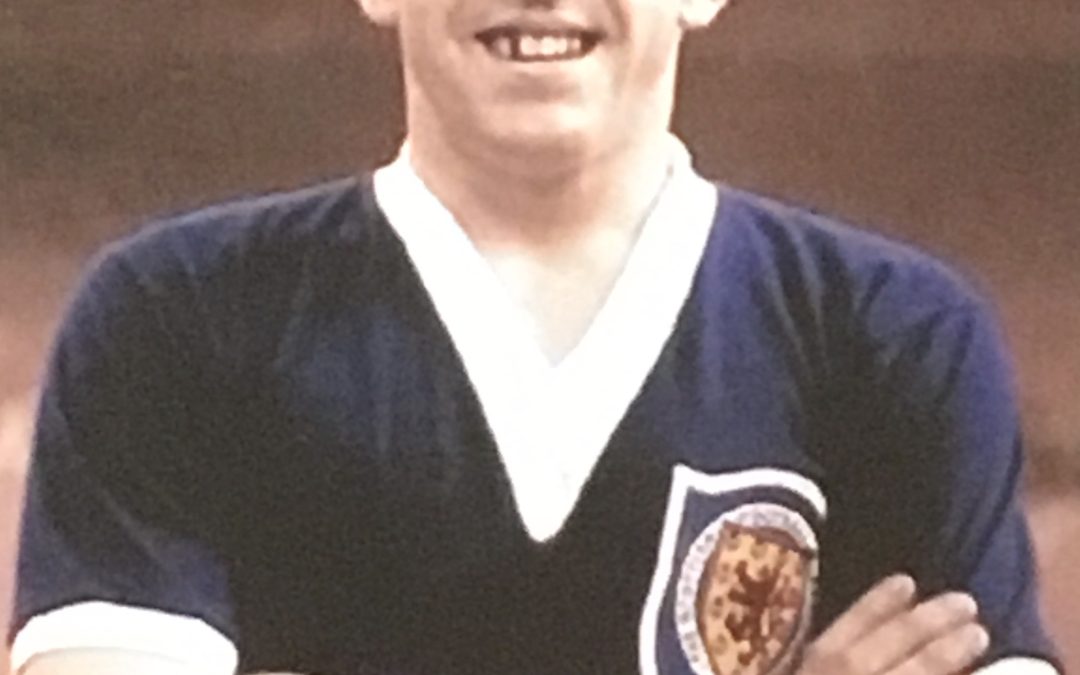THE DAVE MACKAY STORY
BY Vince Cooper
THROUGHOUT his playing career – and then when he went into management – one word defined Dave Mackay – winner.
Born in Glendevon Park, Edinburgh in November 1934, one of four brothers who were all football-mad (one of whom, Tommy, would also later sign for Hearts), David Craig Mackay played for his school, Carrickvale and honed his skills with Tommy whilst the pair did a newspaper and milk rounds to bring in much-needed money whilst their dad was away serving in the army.
Such was his success at Carrickvale that Dave, aged just 12, was chosen for the Edinburgh Under-15 team. The outing was hardly a success however and, played out of position at outside-left, he hardly got in the game.
The Edinburgh selectors continued to pick him to play on the left wing and he continued to disappoint until he was moved to left half for the senior team and helped them win the Scottish Schools Cup, seeing off King’s Park 2-1 (brother Tommy got one of the goals) in a replay at Tynecastle after a Hampden Park draw.
Dave’s skills clearly hadn’t gone unnoticed and after playing for Slateford Athletic he joined Newtongrange Star – well known as a nursery club for Heart of Midlothian – and started to make even more of a name for himself in Scottish footballing circles.
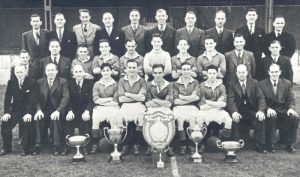
Newtongrange Star 1951-52. Winners of the Edinburgh & District League with Dave right of the ‘keeper.
Dave won Scottish schoolboy honours as a youngster and had a chastening first experience of a big crowd when playing for his country’s schools team against England. There was a crowd of 60,000 at Wembley as well as many more watching on television and they saw Dave, originally a reserve, enter the game after an injury just before half time. But he could do little to help his team who were hammered 7-2 with Johnny Haynes finding the net four times for the hosts.
Mackay joined Hearts, the club he supported as a boy and choosing them over local rivals Hibernian, on his 17th birthday. He was originally allowed to continue his job as an apprentice joiner after agreeing terms of £10 per week in winter and £8 in the summer. He spent his first season playing for the reserves where after initially finding the going physically tough, he settled in, netting seven times from the penalty spot in that initial campaign and ending with a winner’s medal, netting both goals as his team took the Scottish (Reserve) Cup with a 2-1 win over Rangers.
Speaking later in life, Dave made it clear that though there was interest from elsewhere Hearts was the only club for him. “I was a Hearts fan all my life,” he said. “I used to walk the three miles to Tynecastle, go early to get under the turnstile because I couldn’t afford to get in. So when Hearts came along to sign me, I couldn’t believe it.”
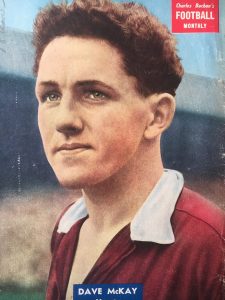
Just before his 19th birthday Dave made his first-team debut at Tynecastle and the team suffered a 2-1 defeat and he was then left out until appearing in the last three games of the 1953-54 season. In between these he switched from part-time to full-time football after realising that if he wanted to reach the top he would need to give the game his full attention.
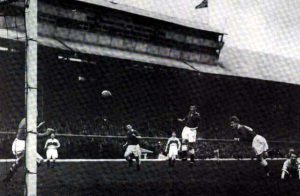
Action from the 1955 Scottish League Cup final
In 1954-55 he claimed a regular place in the team, and had immediate success. Combining playing time with national service in the Royal Engineers (and playing for the British Army team where he lined up alongside Duncan Edwards, Eddie Colman, Maurice Setters and Cliff Jones among others), he flew from his base in Worcester most weekends to form a formidable half-back line alongside captain Freddie Glidden and John Cumming, Mackay and Hearts won the 1955 Scottish League Cup, the club’s first major trophy for almost 50 years, with a 4-2 victory over Motherwell in the final.
Under manager Tommy Walker, Hearts entered a golden period. Walker added Alex Young and Bobby Kirk to what was already a fine group of players and further successes quickly followed.
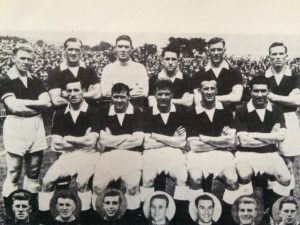
To the Top with Hearts
Whilst only 5ft 7in tall, Mackay played with a style and attitude that made him appear a good few inches taller. Showing the whole-hearted commitment and will-to-win that was to become his byword on the pitch he led Hearts as they captured the Scottish Cup in 1956 with a 3-1 win over Celtic.
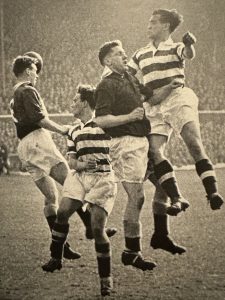
Dave in action in the 1956 Scottish Cup final.
Dave soon went on to complete the full set of domestic trophies by skippering Hearts to the title in 1957-58. The goalscoring trio of the aforementioned Young, Jimmy Wardhaugh and Jimmy Murray terrorised defences and the Edinburgh side won the crown by 13 points, securing a remarkable 62 points out of a possible 68 and losing just one game as they broke a 61-year title drought. They also scored a record 132 goals while conceding a mere 29.

The title winners celebrate in 1958
Even with the scoring exploits of their attackers it was Mackay, despite missing some time with broken bones in his foot, who was chosen as Scottish Footballer of the Year.
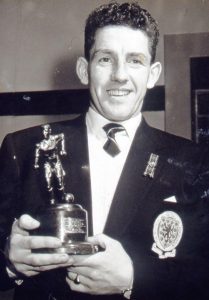
Scotland’s Footballer of the Year
That summer Mackay went off to Sweden to represent his country in the World Cup but he was kept out of the team for the first two games by Doug Cowie of Dundee and only got to play in the last of his country’s three games, a narrow 2-1 loss to France where his job was to mark Just Fontaine.
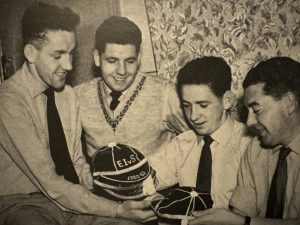
Dave shows some of his Scotland caps to brothers Tommy and Frank, and his dad
He had made his national team debut the previous year in a 4-1 World Cup qualifying defeat to Spain in Madrid and shortly after the World Cup elimination, he was chosen by interim manager Matt Busby (a man Dave once called ‘one of the grandest men I have met in soccer’) as captain for the 3-0 Home International victory over Wales at Ninian Park.
Off to London
Meanwhile back at Hearts, the trophies kept coming, the Scottish League Cup being won with a 5-1 thumping of Partick Thistle. The team were again challenging for the title (they would eventually finish runners-up to Rangers) but on transfer deadline day in March 1959 they accepted an offer of £32,000 from Tottenham Hotspur.
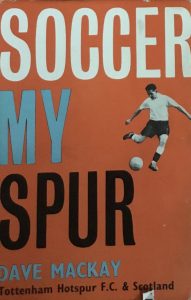
‘Soccer My Spur’
As Dave explained in his book ‘Soccer My Spur’, the move came about quickly. He had missed a match against Dunfermline through injury and on the day after, boss Tommy Walker phoned him at his parent’s house and asked if he could visit. When the Hearts manager arrived it was to tell him that Spurs had enquired about his availability.
Walker stressed that the club didn’t want to sell Mackay but that the decision was the player’s and that Tottenham boss Bill Nicholson was travelling up to talk to him.
Having discussed things with his wife and family, Dave went to Tynecastle on the Monday, met with Nicholson, heard his plans and Tottenham’s offer and decided to move south.
The majority of the money Hearts received was spent on stadium improvements so Dave managed to leave a legacy at Tynecastle both on and off the pitch. In all he had played 179 times for the ‘Jambos’, scoring 22 goals and receiving a solitary booking.
There is no doubt that Mackay was always a ‘Hearts man’. But the sale came at the right time for all concerned with the transfer funds put to good use and the player having the opportunity to test himself in England.

A Spur
The move to White Hart Lane would probably never have happened had Mel Charles not insisted on moving to Arsenal, a decision that no doubt pleased Bill Nicholson eventually.
Spurs offered Swansea Town £30,000 plus forward Dave Dunmore – valued at £15,000 – for Charles but the Welsh international insisted on moving to Arsenal who had offered £35,000. The player got his way, moving to Highbury and within 24 hours Bill Nicholson pounced for Mackay.
Mackay’s debut for his new club came in a 3-1 win over Manchester City where he replaced Jim Iley in the line-up. The 1959-60 season was his first full campaign for the Lillywhites and he immediately formed an outstanding half-back line alongside skipper Danny Blanchflower and England centre-half Maurice Norman. The newcomer also proved that he was no slouch going forward adding 11 goals as the team’s fourth highest-scorer as they finished in third place, just two points behind champions Burnley.
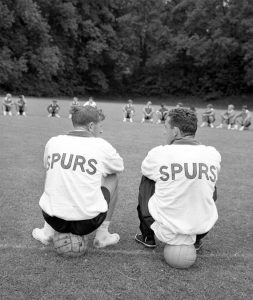
With skipper Danny Blanchflower
The Double
The 1960-61 season proved to be the greatest in the history of the North Londoners with Mackay, along with skipper Blanchflower and Dave’s mercurial compatriot John White, very much at the heart of it.
Spurs scored a mightily impressive 115 goals and romped to the First Division title by eight points from Sheffield Wednesday, before going on to beat Leicester City 2-0 in the FA Cup and becoming the first club in the 20th century to complete the double. Teammate and captain Blanchflower took the Footballer of the Year award for the season but Mackay must have run him awfully close.
The 1961-62 season started off with Spurs taking on an FA XI for the Charity Shield. Against what was more or less the England team of the day, the double winners ran out 3-2 victors with Mackay again at the heart of everything.
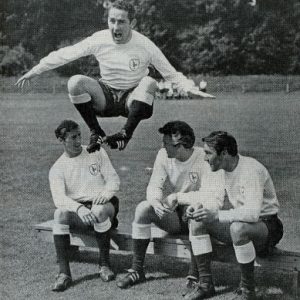
Hurdling over teammates
Spurs lost their hold on the title, finishing third as the Alf Ramsey-led Ipswich shocked everyone to take the crown. The North-London club made good progress in their first stab at European competition, beating Górnik Zabrze, Feyenoord and Dukla Prague (with two goals from Mackay helping to overcome the Czechs) to reach the semi-finals.
In the last four they came up against reigning champions Benfica and the mighty Eusebio. A 3-1 defeat in Lisbon, where Jimmy Greaves had what appeared a perfectly good effort ruled out for offside was followed by Spurs falling behind early in the return at White Hart Lane. Goals from Danny Blanchflower and Bobby Smith got them back into the game. But another Greaves effort was (wrongly) ruled out for offside and the Portuguese team made it to the final where they retained their crown.
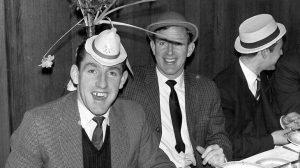
Party time
Success in Europe
Some compensation came with a second successive FA Cup success, this time overcoming Burnley who had pipped them for runners-up spot in the League, in the final 3-1 with Mackay again playing a major role. The arrival of Greaves at the club had forced Dave into a more defensive half-back role as Spurs made adjustments to their style of play. But as his goals tally decreased so the effect he had defensively and in setting up attacks became greater.
At this time manager Bill Nicholson was asked if he felt the Scot was an attacking or defensive wing-half. “Mackay is an all-purpose wing half,” he replied. “He both attacks and defends. He is up helping the forwards one minute and back with the defence the next.”
After kicking off the 1962-63 season with a resounding second successive Charity Shield, this time 5-1 over Ramsey’s Ipswich , Spurs again had to settle for second place in the League with Everton beating them to the crown this time.
An early FA Cup exit as Burnley gained some revenge for the previous year’s final defeat in the third round might have made it a poor season for Mackay and Spurs, were it not for their triumph in the European Cup Winner’s Cup, the first success by a British side in European competition. In reaching the final Spurs won their three ties by an aggregate score of 19-6. Sadly, after scoring in the semi-final win over OFK Belgrade, an injury forced Mackay to watch the final in Rotterdam from the sideline as his team hammered Atletico Madrid 5-1.
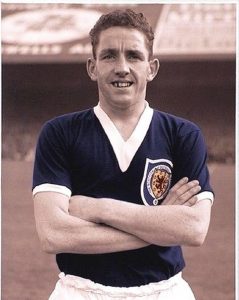
During this period Mackay was regularly omitted from the Scotland team despite his excellent form. A grand total of 22 caps seems scant reward for a player who was undoubtedly one of, if not the best, in his position. This perhaps owes more to the Scottish selection committee often favouring home-based players over often superior compatriots plying their trade south of the border.
An Unlucky Break x2
As defending champions Mackay and Spurs went into the 1963-64 season’s Cup Winner’s Cup and as luck would have it, were drawn for a domestic duel against 1963 FA Cup winners Manchester United in the 2nd round. After a comfortable 2-0 win in the home leg, Dave broke his leg eight minutes into the return when tackled by Noel Cantwell. Without him Spurs fought gallantly but a double strike from Bobby Charlton in the last 15 minutes saw United win 4-1 on the night and 4-3 on aggregate.
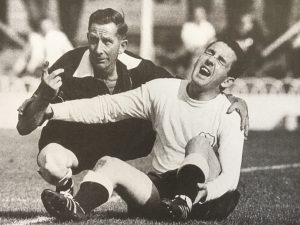
Leg trouble
The break was a bad one and the doctor who reset his leg told him he might never play again. It took Mackay nine months to recover and just as he was approaching full fitness he broke the same leg, in the same place, in a reserve team game against Shrewsbury Town at White Hart Lane.
The second injury meant a total of 18 months out of the game and he finally made his first team return at the start of the 1965-66 season. He would later admit that the leg was ‘never the same again, much weaker’.
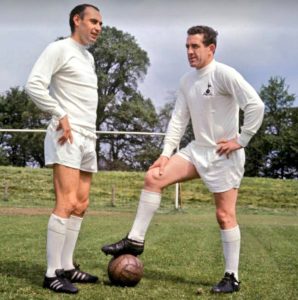
With fellow Scot Alan Gilzean
The first team side he returned to after the injuries was markedly different to the one he had left. John White, the midfield marvel, had so tragically lost his life when struck by lightning on a golf course whilst the likes of Peter Baker, Ron Henry, Les Allen. Bobby Smith and Terry Medwin had all moved on or retired as had Danny Blanchflower, meaning that when Dave returned it was as skipper.
In their place, club had signed a ‘new wave’ including Pat Jennings who took over in goal from Bill Brown midway through the 65-66 season, Alan Mullery and Alan Gilzean. It proved very much a transition season with 8th place in the league and a 5th round FA Cup defeat to Preston.
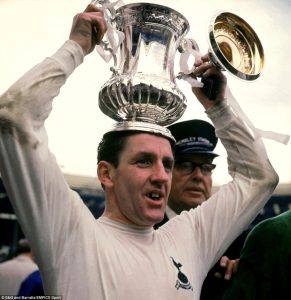
Another FA Cup win and this time as skipper
The 1966-67 season, with the new faces bedded in and centre-half Mike England added, proved a different story. After challenging all season for the title, Spurs couldn’t quite keep up with the pace set by Manchester United and finished in third place, level on points with runners-up Nottingham Forest. In the FA Cup, Dave, now aged 32, led his team to the final where they overcame Chelsea 2-1 in the first all-London clash at Wembley.
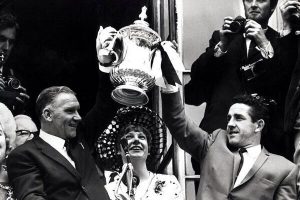
With manager Nicholson and the trophy
The start of that 66-67 season also saw the creation of something of an unwanted Mackay legend. On the opening day of the campaign against Leeds United, he was photographed ‘manhandling’ fellow Scot Billy Bremner. The iconic shot, still used regularly to this day and which hung on the office wall of Sir Alex Ferguson, was hated by the man at the centre of it. “While other people like the photo I don’t because it portrays me as a bully.” He said years later. “I’m not and never have been”.
‘That’ Photo
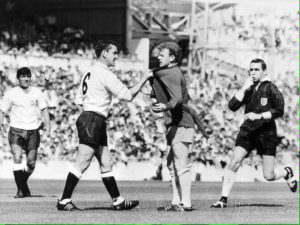
Mackay admitted he was angry with Bremner. “He was a brilliant player but a dirty little b*******””, he said. “He kicked me in the leg I’d just come back from breaking twice. If he’d kicked the other one I could have accepted that. But he kicked the broken one and that really annoyed me. I could’ve killed him that day”. Whilst a similar incident today would no doubt create a storm, both players escaped with a quiet word from the ref, a relief for Mackay who was never sent off in his career. That’s not to suggest that Dave was a saint. One tackle, on Newcastle striker Len White back in 1961 which resulted in a broken leg for his opponent was heavily criticised, even by his own manager, Bill Nicholson.
The following season proved a disappointing one for Mackay and his team. Things started well enough with a share of the Charity Shield after a 3-3 draw with Manchester United that included a memorable goal from Pat Jennings but in the League Spurs never really got going, finishing 8th and they made little impact in the Cups.
Now reaching the veteran stage, Mackay felt that he could no longer play at the highest level and decided that it was time to move on from the club where he had won a First Division title, three FA Cups (one of which was part of that historic double), a European Cup Winner’s Cup and two Charity Shields (along with the share of a third).

Dave joins Derby
Lured by Clough
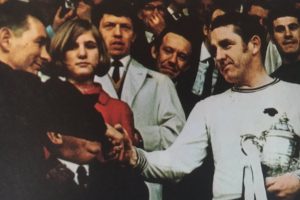
The boss with ‘the boss on the pitch’.
After initially looking set to return to Hearts as player-manager, Mackay was persuaded by Brian Clough to join second division Derby County. Clough, younger than his 33-year-old new boy, admitted that he wanted him more as a leader than anything.
In a great first season at the Baseball Ground he skippered Derby to promotion, missing just one match in the campaign and was jointly named as Footballer of the Year (the first to win the award on both sides of the border) along with fellow veteran Tony Book of Manchester City.

Mackay and Book
He spent a further two seasons at Derby, hardly missing a match and helped the Rams establish themselves in the top flight (they would go on to win the title the season after he departed) and to a Watney Cup success, whilst also nurturing the likes of Roy McFarland and John Robson at the start of their top-class careers.
Dave then took his first step into management at Swindon Town and he spent a year at the County Ground as player-manager before finally hanging up his boots and moving into the managerial seat at Nottingham Forest taking over from long-time boss Matt Gillies.
Management Success
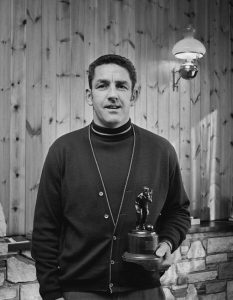
In October 1973 Brian Clough resigned as manager of Derby County and Mackay was given the task of replacing the man who had become a legend at the club. He admitted later that Clough’s were tough shoes to fill, especially with the players.
“It wasn’t the easiest of starts”, Dave later recalled. “It was probably the hottest seat in football at the time with the players and fans clamouring for the return of Brian Clough and Peter Taylor.
“But I told them to play for me in the same way they had played for Clough. It took time for everything to settle down but gradually the trouble abated especially after I had brought in players like Francis Lee, Charlie George and Bruce Rioch”.
Things settled so well, in fact that in his first full season he led the club to the first division title and the following year they finished 4th while reaching the semi-final of the FA Cup. After a poor start to the following season he asked for a vote of confidence from the directors – and was promptly fired!
Mackay’s next stop was lowly Walsall before he accepted a lucrative offer (£40,000 per season) to coach Al Arabi in Kuwait. He spent nine years working there and in Dubai before returning for spells with Doncaster Rovers and Birmingham City. Another spell abroad followed, with two successful years in Egypt winning the title in both seasons with Zamalek and some time in Qatar. He then decided to retire after more than 50 years in the game.
Dave Mackay passed away in 2015 at 80 years old, survived by Isabel his wife of 61 years, and their four children. His death led to tributes from throughout the football world. A statement from Hearts read; “It is with deep regret that we have to advise of the death of Dave Mackay who was possibly the most complete midfield player Scotland has produced.” Spurs called him; “A man who never failed to inspire those around him. In short, a Spurs legend.”

The famous incident with Bremner, and that image, left behind a slightly unfair memory of Dave Mackay. None other than George Best called him ‘The hardest man I ever played against – and the bravest,’ whilst Sir Alex Ferguson named him as captain of his ‘Greatest Ever Scotland XI’, Brian Clough called him ‘the greatest ever Spurs player’ when signing him, and a goal record of 82 in just over 600 games is proof that he had plenty of ability beyond the physical side of the game. Above all of that though, he was a serial winner. More than a dozen major trophies in England, Scotland and Europe, along with Footballer of the Year honours in both countries gave him the kind of record only the very best achieve. Adding managerial success both in England and abroad is further proof of his tactical and motivational abilities.
Those looking for one word to describe Dave Mackay should ignore ‘intimidating’ or ‘hard’ and just stick with ‘winner’.

